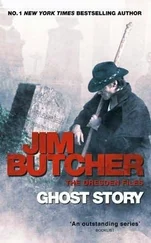I assured him that I did not mind in the very least; that I should be quite as comfortable upstairs; but that I did mind very much their making such a fuss about a matter of that sort with an old friend like myself.
Certainly nothing could look more comfortable than my new lodging when I went upstairs to dress. There was a bright fire in the large grate, an arm-chair had been drawn up beside it, and all my books and writing things had been put in, with a reading-lamp in the central position, and the heavy tapestry curtains were drawn, converting this part of the gallery into a room to itself. Indeed, I felt somewhat inclined to congratulate myself on the change. The spiral staircase had been one reason against this place having been given to the Hampshires. No lady’s long dress trunk could have mounted it.
Sir Francis was necessarily a good deal occupied in the evening with his sister and her husband, whom he had not seen for some time. Colonel Hampshire had also just heard that he was likely to be ordered to Egypt, and when Lynton and he retired to the smoking-room, instead of going there I went upstairs to my own room to finish a book in which I was interested. I did not, however, sit up long, and very soon went to bed.
Before doing so, I drew back the curtains on the rods, partly because I like plenty of air where I sleep, and partly also because I thought I might like to see the play of the moonlight on the floor in the portion of the gallery beyond where I lay, and where the blinds had not been drawn.
I must have been asleep for some time, for the fire, which I had left in full blaze, was gone to a few sparks wandering among the ashes, when I suddenly awoke with the impression of having heard a latch click at the further extremity of the gallery, where was the chamber containing books and papers.
I had always been a light sleeper, but on the present occasion I woke at once to complete and acute consciousness, and with a sense of stretched attention which seemed to intensify all my faculties. The wind had risen, and was blowing in fitful gusts round the house.
A minute or two passed, and I began almost to fancy I must have been mistaken, when I distinctly heard the creak of the door, and then the click of the latch falling back into place. Then I heard a sound on the boards as of one moving in the gallery. I sat up to listen, and as I did so I distinctly heard steps coming down the gallery.
I heard them approach and pass my bed; I could see nothing, all was dark; but I heard the tread proceeding toward where were the uncurtained and unshuttered windows, two in number; but the moon shone through only one of these, the nearest—the other was dark, shadowed by the chapel or some other building at right angles. The tread seemed to me to pause now and again, and then continue as before.
I now fixed my eyes intently on the one illumined window, and it appeared to me as if some dark body passed across it; but what? I listened intently, and heard the step proceed to the end of the gallery, and then return.
I again watched the lighted window, and immediately that the sound reached that portion of the long passage it ceased momentarily, and I saw, as distinctly as I ever saw anything in my life, by moonlight, a figure of a man with marked features, in what appeared to be a fur cap drawn over the brows.
It stood in the embrasure of the window, and the outline of the face was in silhouette; then it moved on, and as it moved I again heard the tread.
I was as certain as I could be that the thing, whatever it was, or the person, whoever he was, was approaching my bed.
I threw myself back in the bed, and as I did see a mass of charred wood on the hearth fell down and sent up a flash of—I fancy sparks, that gave out a glare into the darkness, and by that—red as blood—I saw a face near me.
With a cry, over which I had as little control as the scream uttered by a sleeper in the agony of a nightmare, I called, “Who are you?”
There was an instant during which my hair bristled on my head, as in the horror of the darkness I prepared to grapple with the being at my side; when a board creaked as if someone had moved, and I heard the footsteps retreat, and again the click of the latch.
The next instant there was a rush on the stairs and Lynton burst into the room, just as he had sprung out of bed, crying: “For God’s sake, what is the matter? Are you ill?”
I could not answer. Lynton struck a light and leaned over the bed. Then I seized him by the arm, and said, without moving: “There has been something in this room—gone in thither.”
The words were hardly out of my mouth when Lynton, following the direction of my eyes, had sprung to the end of the corridor and thrown open the door there.
He went into the room beyond, looked round it, returned, and said: “You must have been dreaming.”
By this time I was out of bed.
“Look for yourself,” said he, and he led me into the little room. It was bare, with cupboards and boxes, a sort of lumber place. “There is nothing beyond this,” said he, “no door, no staircase. It is a blind way.” Then he added: “Now pull on your dressing-gown and come downstairs to my sanctum.”
I followed him, and after he had spoken to Lady Lynton, who was standing with the door of her room ajar in a state of great agitation, he turned to me, and said: “No one can have been in your room. You see, my and my wife’s apartments are close below, and no one could come up the spiral staircase without passing my door. You must have had a nightmare. Directly you screamed I rushed up the steps, and met no one descending; and there is no place of concealment in the lumber-room at the end of the gallery.”
Then he took me into his private snuggery, blew up the fire, lighted a lamp, and said: “I shall be really grateful if you will say nothing about this. There are some in the house and neighborhood who are silly enough as it is. You stay here, and if you do not feel inclined to go to bed, read—here are books. I must go to Lady Lynton, who is a good deal frightened, and does not like to be left alone.”
He then went to his bedroom.
Sleep, as far as I was concerned, was out of the question, nor do I think Sir Francis and his wife slept much, either.
I made up the fire, and after a time took up a book, and tried to read, but it was useless.
I sat absorbed in thoughts and questionings till I heard the servants stirring in the morning. I went to my own room, left the candle burning, and got into bed. I had just fallen asleep when my servant brought me a cup of tea at eight o’clock.
At breakfast Colonel Hampshire and his wife asked if anything had happened in the night, as they had been much disturbed by noises overhead, to which Lynton replied that I had not been very well, and had an attack of cramp, and that he had been upstairs to look after me. From his manner I could see that he wished me to be silent, and I said nothing accordingly.
In the afternoon, when everyone had gone out, Sir Francis took me into his snuggery, and said: “Halifax, I am very sorry about that matter last night. It is quite true, what my brother said, that steps have been heard about this house, but I never gave heed to such things, putting all noises down to rats. But after your experiences I feel that it is due to you to tell you something, and also to make to you an explanation. There is—there was—no one in the room at the end of the corridor, except the skeleton that was discovered in the chalk-pit when you were here many years ago. I confess I had not paid much heed to it. My archæological fancies passed; I had no visits from anthropologists; the bones and skull were never shown to experts, but remain packed in a chest in that lumber-room. I confess I ought to have buried them, having no more scientific use for them, but I did not—on my word, I forgot all about them, or, at least, gave no heed to them. However, what you have gone through, and have described to me, has made me uneasy, and has also given me a suspicion that I can account for that body in a manner that had never occurred to me before.”
Читать дальше












